
The Internet's Premier Classical Music Source
Related Links
-
Bartók Reviews
Brahms Reviews
Glinka Reviews
Gluck Reviews
Kreisler Reviews
Leclair Reviews
Locatelli Reviews
Meyerbeer Reviews
Nicolai Reviews
Offenbach Reviews
Rachmaninoff Reviews
Schubert Reviews
Smetana Reviews
Strauss Reviews
Suppé Reviews
Tchaikovsky Reviews
Thomas Reviews
Weber Reviews - Latest Reviews
- More Reviews
-
By Composer
-
Collections
DVD & Blu-ray
Books
Concert Reviews
Articles/Interviews
Software
Audio
Search Amazon
Recommended Links
Site News
 CD Review
CD Review
Mercury Living Presence
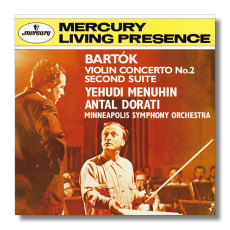
Béla Bartók
- Concerto #2 for Violin and Orchestra
- Second Suite for Orchestra
Yehudi Menuhin, violin
Minneapolis Symphony Orchestra/Antál Doráti
Mercury Living Presence 434350-2 ADD 67:43

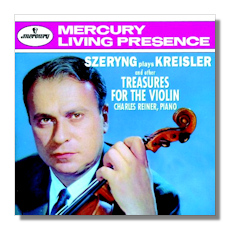
Fritz Kreisler Favorites
and other Treasures for the Violin
- Fritz Kreisler:
- Tambourin chinois, Op. 3
- The Old Refrain
- Allegretto in the style of Boccherini
- Caprice viennois, Op. 2
- Chanson Louis XIII in the style of Couperin
- Liebesleid
- Menuet in the style of Porpora
- Praeludium & Allegro in the style of Pugnani
- Recitativo & Scherzo-Caprice for Violin Solo, Op. 6
- Rondino on a theme by Beethoven
- Schön Rosmarin
- Tempo di Menuetto in the style of Pugnani
- Jean Marie Leclair: Sonata for Violin, Op. 2 #3 in C major
- Christoph W. Gluck: Orfeo ed Euridice - Dance of the Furies
- Sergei Rachmaninoff: Transcription of Kreisler's "Liebesfreud"
- Pietro Antonio Locatelli: L'arte del violino, Op. 3 - Concerto #12 in D Major (Caprice)
Henryk Szeryng, violin
Charles Reiner, piano
Mercury Living Presence 434351-2 ADD 64:26

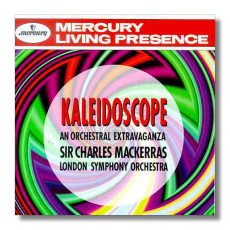
Kaleidoscope - An Orchestral Extravaganza
- Bedrich Smetana: Bartered Bride, B 143/T 93: Dance of the Comedians
- Otto Nicolai: Overture "Die Lustigen Weiber von Windsor"
- Johann Strauss Sr.: Radetzky March, Op. 228
- Giacomo Meyerbeer: Le Prophète: Coronation March
- Johannes Brahms: Hungarian Dance, WoO 1 #1
- Ambroise Thomas: Overture "Mignon"
- Piotr Ilyitch Tchaikovsky: Mazeppa - Cossack Dance
- Franz von Suppé: Overture "Die Banditenstreiche"
- Jacques Offenbach: Orphée aux enfers - Overture & Can-can
- Mikhail Glinka: Capriccio brillante on the theme "Jota aragonesa"
- Carl Maria von Weber:
- Overture "Abu Hassan", J 106
- Invitation to the Dance, J 260 (Op. 65)
London Symphony Orchestra/Charles Mackerras
Mercury Living Presence 434352-2 ADD 75:09

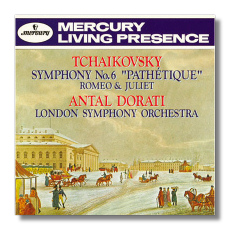
Piotr Ilyitch Tchaikovsky
- Symphony #6 in B minor, Op. 74 "Pathétique"
- Roméo & Juliet Fantasy Overture
London Symphony Orchestra/Antál Doráti
Mercury Living Presence 434353-2 ADD 63:22

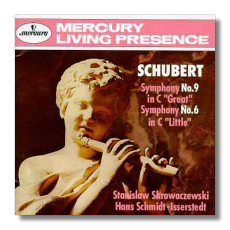
Franz Schubert
- Symphony #6 in C Major, D.589 "The Little" **
- Symphony #9 in C Major, D.944 "The Great" *
* Minneapolis Symphony Orchestra/Stanislaw Skrowaczewski
** London Symphony Orchestra/Hans Schmidt-Isserstedt
Mercury Living Presence 434354-2 ADD 73:49
Here are some brief reviews of recent reissues from Mercury Living Presence, with more to come:
Menuhin and Doráti had strong historical and artistic connections with Bartók's music. The violinist recorded this very same concerto just four years earlier, and with Wilhelm Furtwängler and the Philharmonia Orchestra, no less (EMI Références CDH69804, reissued as Références 74799), but I prefer this later (1957) version because the orchestra is more idiomatic and athletic, if not as subtle. Doráti shaves about two minutes from Furtwängler's total timing. As for the suite, which was taped for Mercury in 1955, it's hardly been recorded at all. It's an early work, and very colorful, with many foretastes of The Wooden Prince, which was to follow in less than a decade. The recordings are detailed, but rather pallid when compared to much of Mercury's later work.
Simply stated, the Szeryng disc belongs in every violin-fancier's collection. Szeryng's tone is warm and rich, and his interpretations are sentimental but not saccharine. Furthermore, search Opus for other collections of Kreisler's goodies – this disc includes a lucky thirteen – and you'll find surprisingly few. I haven't heard all of these collections, but I doubt that I'd prefer any of them to Szeryng's. (It's worthwhile to hear Kreisler play Kreisler, first on an EMI Références reissue, and now in RCA Victor's integral edition. However, these recordings sound their age.) Mercury's program includes the hits: "Caprice Viennois," "Liebesleid," "Liebesfreud," "Tambourin Chinois," and others. This material was recorded in 1963 and originally released as SR90348. Mercury's reissue fills the program out with Léclair's Third Sonata, a bit of Gluck, and Locatelli's The Labyrinth, also recorded in 1963, and originally released as part of SR90367. With the finest possible performances and recording quality, this second CD is the pick of the five.
Do you know lovers of classical music who jog or engage in other aerobic activities? "Kaleidoscope," an energetic orgy of popular light classics, just might increase their performance. Most athletics-minded music-lovers probably already have recordings of the overture to The Merry Wives of Windsor, the Coronation March from Le Prophete, and the other goodies on this disc, but they should consider this lucky collection of thirteen brief orchestral works anyway. Mackerras and the London Symphony zippily recorded these selections in Walthamston Town Hall in July 1961, and Mercury gave them the best sound they had to offer. So what if the music is a little corny (the overture to Suppé's Jolly Robbers ? – puh-leez) and the playing is a little unsubtle? Whatever you're doing, this CD will make you do it faster and enjoy it more. If you're driving, you might end up with a ticket.
Almost everyone has a "Pathétique" – many have more than one. (I have about fifteen, and I'm not depressed yet.) Taken as a whole, Doráti's Mercury cycle of Tchaikovsky's six symphonies has its merits, but as with any complete cycle, its components are surpassed by several individual recordings. Few would dislike Doráti's passable Sixth, but few would prefer it to Cantelli's, Toscanini's, Furtwängler's, or Pletnev's better recordings of the work. Although Doráti's fidgety phrasing enlivens Tchaikovsky's more extroverted works (the ballets are excellent), it tends to splinter the composer's longer lines: for example, the first movement's second theme is disconnected into a series of poorly-related little episodes. Balance frequently is not optimal, probably because of the orchestra's poor articulation in the faster passages. Passion in Roméo and Juliet isn't exactly perfunctory, but the lovers barely steal a single kiss before their families' conflicts rain down upon them again. These recordings were made in 1959 and 1960. They're a little hissy, and the sound isn't nearly as good as on "Kaleidoscope," possibly because of different recording locations.
Finally, a double helping of Schubert brings the present set of Mercury Living Presence reissues to a close. Skrowaczewski's "Great" was recorded in 1961 in Northrop Memorial Auditorium on both 3-track tape and 35mm film. (Unfortunately, the latter was not available for this reissue.) This recording offers a foretaste of Schubert on original instruments; the conductor's light touch and breezy tempos, and the orchestra's wiry strings aren't far from what Norrington, Harnoncourt, and others have recorded in recent years. Skrowaczewski finds no titanic climaxes or olympian raptures in this "Great," whose total timing is just over forty-five minutes. The second movement, marked Andante con moto, is positively perky here. The MSO's strings are taxed by the seemingly endless triplets in the Finale, but, all in all, this is a well-played, lightweight performance, albeit one which lacks the marmoreal qualities that other conductors and orchestras have brought to it. The "Little" C Major was recorded three years earlier. This delightful work dances between hints of Haydn and bites of Beethoven but is Schubertian to the core. Schmidt-Isserstedt, an underrated conductor, finds the right tone for each of the movements, except possibly for the Finale, a notoriously difficult movement to find the right tempos for. The London Symphony is on its toes for this recording, and the engineering for both recordings is among Mercury's best.
Copyright © 1996, Raymond Tuttle



















